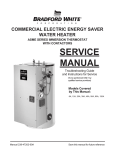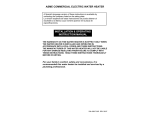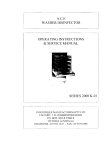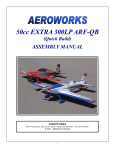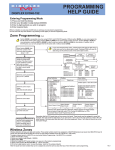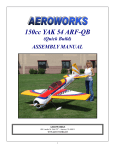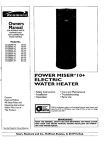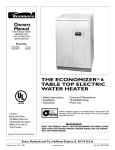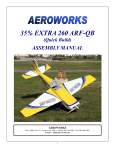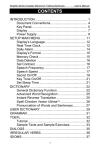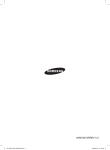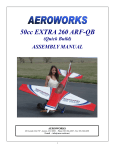Download RedWing RC Slick Instruction manual
Transcript
Slick Assembly Manual Slick Assembly Manual Thank you for purchasing the RedWing RC Slick. We have provided you with the highest quality kit and flight performance possible. We wish you great success in the assembly and flying of your new RedWing RC Slick. Caution! 1. You should not regard this airplane as a toy. 2. To ensure safety, please read this instruction manual thoroughly before assembly. 3. Building and operating a model airplane requires diligent practice and correct guidance. An inexperienced flyer can cause serious injury and property damage. 4. Seek the assistance of an experienced RC pilot or model airplane club for help with assembly, operation and maintenance to assure your flying experience is both enjoyable and safe. 5. Fly only in AMA (Academy of Model Aeronautics) approved areas. Redwing RC warrants this model to be free from defects in both materials and workmanship from date of purchase. This warranty does not cover any component parts damaged by use or modification. In no case shall RedWing RC’s liability exceed the original cost of the purchased kit. Further, RedWing RC reserves the right to change or modify this warranty without notice. In that RedWing RC has no control over final assembly or materials used for final assembly, no liability shall be assumed nor accepted for any damage resulting from the use by the user of the final userassembled product. By the act of using the user-assembled product, the user accepts all resulting liability. We, as the kit manufacturer, have provided you with a top quality, thoroughly tested kit and instructions, but ultimately the quality and fly ability of your finished model depends on how you built it; therefore, we cannot in any way guarantee the performance of your completed model, and no representations are expressed or implied as to the performance or safety of your completed model. Specifications Wingspan: 87” Wing area: 1440 in² All up flying weight: 15 to 17 pounds, depending on hardware and building style Overall length: 83” Engine: any 50 to 60cc engine (DLE 55, DLE 55RA, DLA 58 recommended) Radio: 6 channel recommended (4 channel possible) CG: 25 to 30% back from LE at root Servos: 200 in-oz torque, metal gear. Digital servos are recommended. Assembly Prior to assembly, inspect entire framework. Pay particular attention to covering and seams in covering. Temperature extremes in shipping containers sometimes cause wrinkles or loose seams to form. Most wrinkles and loose seams can easily be fixed by taking a little time with a sealing iron or heat gun. Persistent wrinkles are generally caused by air trapped under the covering. These can be removed by puncturing the covering with a pin to create and escape for the air. Vibrations during shipping can loosen glue joints. These can be repaired with CA glue. Notes on Assembly Assembly order is non-critical. Many steps can be done whenever the builder wants to do them. For instance, hinging of all surfaces can be done at the same time. Same goes for control horns. They can all be done at the same time. Installation process for both hinges and control horns will be described once. The order described in this manual is intended to minimize the time it takes to assemble this kit. It is recommended that the landing gear be installed early to keep the fuselage from rolling. Wheels and pants can be installed at any time. Some builders may prefer to install the wheels and pants last, just to keep the airplane from rolling off their work bench. Hardware required to finish the kit 50 cc class engine with muffler (DLE-55, DLE-55RA or DLA-58 recommended) Standoffs for engine (normally included with engine) Propeller: 23”x8” or 24”x8” (suitable size for engine used) Spinner: 3-3/4” Servos: 5 for flight surfaces (XQ 4020 available from RedWing RC) 1 for throttle (metal gear recommended) Receiver: 4 channel minimum. 6 channel or more recommended Transmitter: 4 channel minimum. 6 channel or more computerized recommended Optical kill switch on ignition recommended (available from RedWing RC) Battery: 3000 mah LiFe can be used for both ignition and receiver (available from RedWing RC) If desired, a separate battery of at least 1000 mah capacity can be used for ignition. Switch: 2 HD switches (available from RedWing RC) Servo extensions: Aileron: two 12” heavy duty and two 6” (available from RedWing RC) Elevator: two 36” heavy duty (available from RedWing RC) Throttle: 12” heavy duty (available from RedWing RC) Servo safety clips for each extension (available from RedWing RC) Tools, etc. required to finish model Screwdrivers: Phillips and common Wrenches: metric open end or box Ball drivers or allen head wrenches Drill with assorted bits Pliers or crimping tool Hobby heat gun and hobby sealing iron Modeling knife (X-acto with #11 blade, or equivalent) Wire cutters Pen or marker (Sharpie, or equivalent) Scissors Thin, medium CA and CA accelerator 15-30 minute epoxy with mixing cups and mixing sticks Gorilla Glue or Tightbond II for hinges (if don’t want to use epoxy) Blue threadlock Rubbing alcohol and wipes or paper towels (denatured alcohol may affect painted surfaces) Q-tips are handy, but not a necessity Hemostat or small needle nosed pliers Notes on radio installation While this airplane can be flown with a simple 4 channel transmitter, it is recommended that at least 6 channel computerized transmitter be used. The 4 channel transmitter would require the use of Yharnesses on both aileron and elevator servos. The 6 channel transmitter allows plugging each servo into its own channel. Servo sub trim and end points can then be adjusted to optimize the servo control horn configuration. At neutral, aileron servo arms should be parallel with the aileron hinge line. Elevator servo arms should be vertical. Turnbuckle type pushrods are included for the ailerons and elevators. Turnbuckles have a left hand thread on one end and a right hand thread on the other. They are convenient as they allow finer adjustments than a conventional clevis. They also allow adjustment without disconnecting anything. However, initially they are easier to set up if you center the servo arm, center the control surface and hold the turnbuckle up to both ball links to see how far to thread the turnbuckle in. Thread the turnbuckle this amount into each ball link. This will have the pushrod length close to what is needed. It can be further adjusted after installing the servo arm on the servo. Make a point to install the turnbuckles in the same direction on all control surfaces. For instance, use the right hand thread at the servo and left hand thread at the control horn. If they are all installed the same way, then rotating the turnbuckle clockwise or counter clockwise has the same effect on all control surfaces. For instance, turning clockwise shortens the pushrod and pulls the control surface down. Recommended control setup has control surface ball links installed on the outer hole of the control horns and the other ball link attached at the second from the outer hole on the servo arm. Adjust servo end point on the transmitter to give desired control throw. Rudder ball links should be installed using the outer holes on the servo arm. Make sure elevator halves center to the same place. This is done by positioning the servo arms so they are both vertical when the elevator stick is neutral. Adjust the length of the turnbuckle pushrods for neutral elevator. Maximum throw in both directions is set with servo end point on the transmitter. Select an inner hole on the throttle servo arm that requires servo throw of greater than 100% in both low and high throttle directions. The model assembled for this manual has a 1” throttle arm on the carburetor and the pushrod is ¾” from the center of the servo spline. This requires about 115% throw in both high and low directions to achieve full throttle throw. +- Main gear is installed using nuts and bolts that are inserted in predrilled holes. Bolts go through landing gear cover, main gear, then fuselage bottom. Nuts are installed inside the fuselage and accessible via the canister tunnel. Note: remove covering from landing gear cover at four bolt positions. Drill holes for mounting screws. Place tail wheel bracket in positions and mark location of the mounting holes Install tail wheel bracket only. Note: wheel and steering linkage can be installed later. Several different types of adhesive are acceptable for installing hinges. Epoxy, Gorilla Glue and aliphatic resin (Titebond II) all work. One benefit of the aliphatic resin is it cleans up with water until it cures. A dental syringe is an excellent tool for injecting glue into the holes. Remove all hinges from their pre-drilled holes. Scuff barbs on all hinges with coarse sandpaper or similar tool. Note: two hinges have had one barb clipped off. The short side of these two hinges go into the stabilizer in the hole closest to the fuselage. Place a small amount of lubricant on the pin of the hinge and flex the hinge back and forth to coat the pin with lubricant. Lithium grease was used in this model. You can use the same Lithium grease to keep your door hinges from squeaking. Inject a small amount of adhesive into the hole in the flying surface. Also add some adhesive to the barbs of the hinge. Insert the hinge into the hole until the pin is at the hinge line. Install all hinges in the flying surface. Make sure all hinges line up the same. If you would like, proceed directly to installing the hinges in the control surface at this time. Inject adhesive into all holes and onto the barbs of all hinges. Make sure all hinges will go in holes. Push elevator into position. Once hinges are properly seated, rock elevator back and forth a few times to help align hinges. Once all hinges have been installed, clean off excess adhesive. Note: minimal hinge gap and bevel to bevel throw. If necessary, increase hinge gap slightly to achieve desired control throw. Repeat process for aileron and rudder hinges. Note: minimal hinge gap and bevel to bevel throw. Remove covering over aileron servo openings and control horn slots. Covering can be removed by either cutting it off with an X-acto or similar knife or by melting it with a pencil type of soldering iron. The soldering pencil seals the covering to the structure, but leaves some excess that needs to be cut off. Openings in fuselage for horizontal stabilizer mounting, elevator servo lead and rudder pull-pull cable exit. Note slots for rudder horns near bottom of rudder. Slot opened in horizontal stabilizer for the elevator servo arm and elevator slots for control horns. Assemble control horns assemblies and tighten bolt. Scuff bottom of control horns (glue area) with coarse sandpaper for better adhesion. Inject epoxy into both control horn slots. Apply additional epoxy to both sides of each control horn. Insert control horns into slots and clean up excess epoxy that oozes out of slots. Rudder horns need to be trimmed to fit. Elevator control horns have been installed. Note: excess epoxy has not been cleaned off yet. Rudder uses two pairs of control horns for pull-pull cables. The horns install directly opposed from each other, thus will not fit unless trimmed. The horns on the left have been marked. The horns on the right have been trimmed. Verify both sets of horns fit prior to gluing in place. Install both pairs of rudder control horns with epoxy. Pull-pull cable will be installed later. Verify control horns have cured prior to installing servos. Install isolation grommets and brass bushings in all servos. Note: brass bushings are installed from the bottom. Reinstall aileron servos. Use 18” (or 12” with 6” at receiver) extension on servo lead. Don’t forget to use some sort of restraint on the connector. Restraints are commercially available. Dental floss can be wrapped around the connector and tied 3 or 4 times. Some people like heat shrink tubing. If heat shrink is used, avoid overheating the connector. Set aileron servo in position. Drill all four holes for mounting screws. Install screws, then remove and move servo out of the way. Place a drop of thin CA glue in each hole to toughen threads in the plywood. Install aileron servo. Note: servo spline is closer to the leading edge of the wing. Prepare servo arms. Carbon fiber arms are provided for all control surface round wheels that Remove covering overservos. aileron The servo openings and come the servos can be can used. desired,by controlwith horn slots. Covering be Ifremoved aluminum wheels bean purchased RedWing either cutting it offcan with X-acto orfrom similar knife or RC for an additional cost. These are iron. drilledThe by melting it with a pencil type ofwheels soldering and tapped to fitseals the arms. soldering pencil the covering to the structure, but leaves some excess that needs to be cut off. Set control surface at neutral. Center servo. Hold turnbuckle up to ball links to get an idea of how far to thread the turnbuckle into the ball links. Ball links can be pre-threaded with the help of a variable drill. Chuck the turnbuckle pushrod Openingsspeed in fuselage for elevator mounting, elevator into drill and thread into the exit. ball link. Just be servothe and rudder pull-pull cable sure to use a slow speed when threading the ball link. Pre-thread both ball links. Leave the turnbuckle on the second ball link. Manually thread the turnbuckle back onto the first ball link. Completed aileron servo/turnbuckle installation. Servo arm is parallel to hinge line when aileron is Slots for elevator control horns have been marked, neutral. but not cut yet. Install elevator servo inside the horizontal stabilizer with output splineover facing the leading edge. Anand easy Remove covering aileron servo openings way to hold servo screwscan is tobeuse a hemostat control hornthe slots. Covering removed by inserted through the servo slot. either cutting it off with an arm X-acto or similar knife or by melting it with a pencil type of soldering iron. The soldering pencil seals the covering to the structure, but leaves some excess that needs to be cut off. Install elevator servo arm and turnbuckle pushrod. Ball link is bolted on the servo side of the servo arm (away from fuselage). This gives the straightest Openings in the fuselage for elevator mounting, elevator linkage andrudder improves the mechanical servo and pull-pull cable exit. advantage over mounting the ball link on the other side of the servo arm. A nut tied to a string can be used to help pull the elevator servo extensions the length themarked, fuselage. Slots for elevator control horns have of been but not cut yet. Note slots for rudder horns near bottom of rudder. A magnet on an extendible wand makes pulling the elevator servo extension muchservo easier. Magnetand Remove covering over aileron openings attracts the nut on the string.can Collapse the wand control horn slots. Covering be removed by as the extension is off pulled theorfuselage. either cutting it withthrough an X-acto similar knife or Alternately, fuselage the firewall andThe by melting itstand with athe pencil type on of soldering iron. shake gently while feeding the extension. soldering pencil seals the covering to the structure, but leaves some excess that needs to be cut off. Mounting holes in the carbon fiber arm do not line up with the aluminum and must be drilled. Use a Openings in fuselagewheel for elevator mounting, elevator small and pull-pull drill through desired holes in servo drill and bit rudder cablethe exit. the wheel. Once all holes are drilled, remove the aluminum wheel and redrill the holes in the CF arm with the proper size. Bolt aluminum wheel to CF servo arm. Rudder pull-pull cables have been run, but crimps are not installed. If using heat shrink tubing over crimp Note slots rudder horns near itbottom of rudder. and end offor wire, be sure to slide over the wire prior to installing the crimps. The shrink tubing provided in the kit does not fit over the threaded connector. Slots for elevator control horns have been marked, but not cut yet. Insert cable through crimp, then to threaded connector. Double cable back through crimp. Loop cable back through crimp. Pull end to shorten loop prior to crimping. Crimp with either pliers or a crimping tool. Add a drop of CA after crimping. Assemble both rudder cables to the length determined earlier. Once crimped, slide shrink tubing up over end of wire and the crimp. Heat tubing to shrink. Thread one end of cable onto ball link on rudder horn. Feed cable through fuselage to rudder servo arm. Remove ball link from servo arm. Thread cable end onto ball link. Reattach ball link to servo arm. Install second cable, making sure to cross the cables. Note: getting cables tight enough and centering rudder is a trial and error process. Cables need to be snug, but not “guitar string” tight. Let’s move on to the fuselage. Firewall is laser etched for DLE-55 mounting bolts. A DLA-58 is being installed on this Slick. The bolt pattern is slightly different than the DLE-55. Mounting holes were adjusted and drilled accordingly. Install standoffs but don’t use thread lock on bolts yet. Note: a 10 mm open end wrench fits on the flats of the standoffs. Temporarily mount engine. Make a template of the engine head using poster board (or something similar). Tape to fuselage near landing gear. The tape will act as a hinge. Remove engine and install cowl. Fold template back onto the cowl. Trace outline of engine head onto cowl using Sharpie or similar marker. Fold template back and remove cowl. Make initial cut somewhat smaller than the template shows. The cowl has a pretty steep slope at the engine head location. This opening doesn’t have to be as long as the engine head. Trial fit the cowl over the engine. There should be about 1/8” clearance along both sides and the front of the engine head. Check to see how the engine fits the cowl. There must be a difference in centerline between the DLE and DLA engines. Cowl will not line up properly with spinner backplate. Mounting holes were revised to center the engine within the cowl opening. It looks OK now. Remove cowl. While engine is still mounted, remove standoff bolts (from firewall) one at a time and add threadlock. Reinstall all four standoff bolts. Mark location of throttle pushrod and fuel line. Remove engine (leave standoffs in place) and drill both holes. Reinstall engine. Temporarily mount muffler. In the case of a DLA-58 the muffler interferes slightly with the side of the motor box. A notch had to be cut off. The firewall is completely behind this notch, so the cut is cosmetic only and won’t affect strength. Put head template back on. Add a section to template for the muffler. Carefully remove muffler. Reinstall cowl. Transfer position of the muffler stack to the cowl. Note: the cutout for the engine head goes just past the spark plug. Cut the opening for the muffler stack. While you are at it, cut the exhaust opening. Reinstall muffler using the gasket and threadlock. Install cowl. It may be necessary to enlarge the muffler stack opening for additional clearance to install cowl. There may also be an interference with the front of the muffler like there is in the case of the DLA-58. Reinstall engine. This time use threadlock on all bolts. A G10 plate was used as a choke guide. DLA didn’t include a longer throttle arm, so one was made out of G10. A ball link is bolted to the throttle arm. A snap on ball connector was used on the choke linkage to give clearance over the throttle linkage. Ignition will be held on using Velcro and a zip tie (not included with kit). Cut holes through side of motorbox for zip tie. Note: if the ignition is installed to far forward on the motorbox, it will interfere with installing the cowl. Add spiral wrap to power lead, halls sensor lead and spark plug wire. Predrill servo mounting holes in throttle servo mount. Add a drop of thin CA to each hole. Glue servo mount into place. A 550 cc 3 line tank comes preassembled and installed. We opted to use a 16 ounce tank from Fortitude. Tank is strapped in with Velcro. Vent line loops back over the end of the tank prior to exiting out the motorbox bottom. This is a 3 line tank. The other lines go to the carburetor and fuel dot for filling and emptying tank. Note: throttle servo and pushrod have been installed. Reinstall cowl. Upper bolts are accessed from the canopy side. Bottom bolts are accessed from inside cowl and are difficult to install. Exhaust opening can be used to access bolts. Bottom nuts and bolts can be replaced with rare earth magnets. Use one magnet on cowl ring, one on the fuselage. Remember to arrange magnets to attract, not repel. We also put a bolt at the bottom center of the cowl ring. Install axles on main landing gear. Note: the wheel pants have a tight fit on the axles. The axles need to be oriented so flat sides are vertical (points are up and down). Wheel pants have a very tight fit with wheels. The wheel pants have to be opened up to fit the wheels properly. Install wheel pants. Place a drop of medium CA under each blind nut as the bolt is being tightened. Axles need to be shortened about ¼” to fit in the wheel pants. File flat spots on axle at wheel collar locations. Mounting bolts are too long and need to be shortened to avoid hitting the wheels. Install wheels and wheel collars. Wheels and wheel pants installed. Note: when properly aligned, the front pant hides the back one. Only one wheel collar is given in the kit for the tail wheel. A washer was soldered onto the axle to center the wheel. A second washer was soldered as a stop to keep the axle from riding up the tail wheel bracket too far. File a flat spot for the wheel collar. Install the tail wheel assembly onto the CF tail wheel bracket. Drill a hole in the bottom of the rudder for the alignment pin and epoxy pin in place. Leave at least ½” of the tiller wire sticking out beyond the alignment pin. This will prevent the tiller wire from coming out of the pin with high rudder throw. Installing engine other than DLE-55 Support fuselage vertically on ladder (or similar). You want the firewall to be horizontal. Place engine on firewall. This is a 3W-55i with a metal mounting plate. These standoffs are short oak dowels. The mounting bolts with go through the mounting plate, dowel and firewall. Carefully remove spinner backplate and cowl. Draw circles around the standoffs. Mounting holes will be drilled in the center of the circles. In this case, holes were drilled through the dowels and firewall. Spinner backplate should line up like this. Set cowl and spinner backplate in position. Cut cowl as required to clear the head fins. Move the engine until the spinner backplate lines up properly with the cowl. Make sure cylinder remains vertical. Canister muffler installation using 3W-55i and MTW canister Rear of canister muffler needs to be shock mounted. Install four pieces of silicone in pre-cut mounts. Note – silicone is not included in kit. Note how canister fits in the tunnel. This header (available from Aircraft International) seems to be custom made for the 3W-55i in this airplane. Engine, header and canister installed. Note coupler between header and canister. Also note a small corner of the motorbox was cut off to clear the header. This was cosmetic only and did not affect strength at all. Prior to Flying Verify center of gravity is within the recommended range. Starting point is 25 to 30% (5” to 6”) back from the leading edge at the root. Adjust to suit your personal flying style and preferences. Control Throws: Normal Flying 3D Flying Surface Aileron Elevator Rudder Throw 25° 20° 30° Expo 25% 20% 20% Aileron Elevator Rudder 40° 45° 50° 40% 40% 35% Once again, these settings are a recommended starting point. Adjust to suit your flying style and preferences. Note: Futaba flyers should use negative values for exponential. Balance the propeller. It is a good idea to balance it end to end and balance the hub. Redwing RC has a video that demonstrates how to balance the propeller hub. http://www.redwingrc.com/video/propvid.htm Verify that all hardware (bolts, screws, wheel collars, etc.) are tight. Check engine operation. It should run smoothly at all throttle settings. Do not attempt to fly unless the engine is operating reliably. Range check the model according to your radio manufacturer’s recommendations. Range check should be performed both with and without the engine running. Do not attempt to fly if there is a large reduction in range with the engine running until the cause for the discrepancy is determined. Verify all batteries are fully charged. Check that all control surfaces are centered. Trim levers on transmitter should be centered. All hinges should operate smoothly, with no binding. They should be tight and not pull out. Verify that all controls move in the proper direction. Engine positioning There is a fairly simple way to determine or double check positioning of the engine prior to drilling any holes. This method requires a way of holding the fuselage vertical while position is being checked. One way to hold it vertical is by strapping the main landing gear to a step ladder. The method is described below: 1. Hold the fuselage vertical by standing it on end and strapping the main landing gear to a step ladder. Use padding as required to avoid denting or marring the finish of the fuselage. 2. Bolt the engine to all four standoffs. 3. Place the engine on the firewall in the approximate mounting location. Starting point is to center the standoffs over the laser etched marks on the firewall. 4. Slide the cowl over the engine and onto the fuselage. The cowl ring will hold it in place. It doesn’t have to be bolted on at this time. In order for this step to work, the initial hole for the engine head has to have been cut into cowl already. 5. Place spinner backplate on engine. 6. Move engine until spinner backplate lines up with cowl. Make sure engine cylinder lines up vertically with fuselage. 7. Carefully remove spinner backplate and cowl. Avoid moving engine. 8. Draw a circle on the firewall around the base of each standoff. 9. Remove engine. 10. Holes for mounting bolts should be drilled at the centers of the circles. 11. If installing a DLE-55, the centers of the circles you drew should match the laser etched locations on the firewall.



























